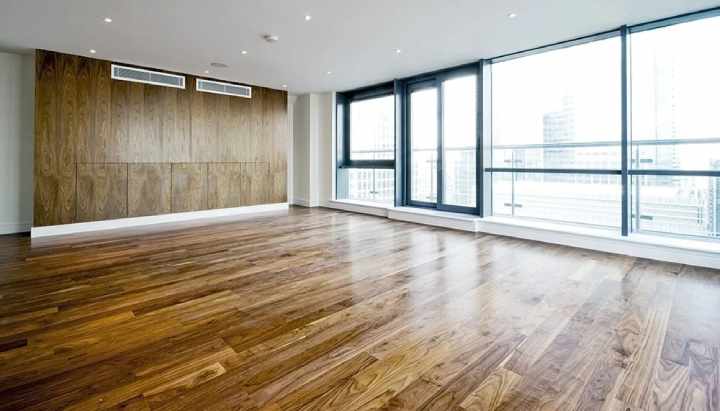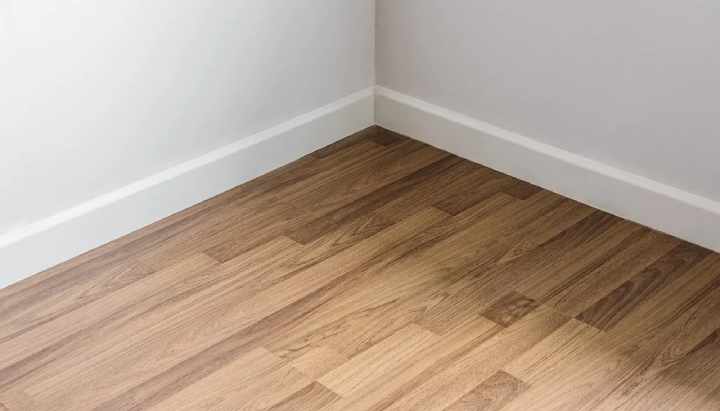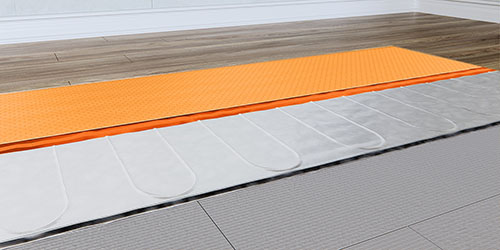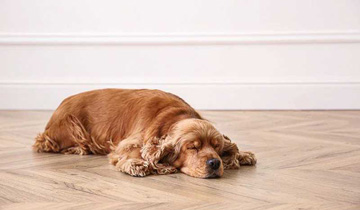5 min read
Can you use electric underfloor heating under carpet?
When you think of underfloor heating, the first thing that most likely comes to mind is heating a tiled floor in a bathroom or wet room. However,...

One of the most common questions that we get asked is ‘what is the best underfloor heating for timber floors?’ So, we’ve put this useful guide together which addresses everything you need to know. Ready? Read on…
There is nothing like beautifully finished timber flooring with the added bonus of warmth! Many homeowners love combining the look and feel of warm timber floors to achieve optimum comfort in their living spaces. Not only that, but they act as a wonderful and convenient conversation starter among guests!
Can you put underfloor heating under wooden floors? Absolutely, you can! Ask any homeowner who has underfloor heating, and chances are they will say they would never be without it! In fact, there was an increase of 400% from 2019 to 2020 of homeowners installing electric underfloor heating for their timber floors.
But why? Well one good reason is that, with underfloor heating installed, there is no need for radiators. Aside from spoiling the clean lines of a room, radiators can take up valuable wall space. And when you consider that on average, UK homeowners are spending 3 hours and 48 minutes in their living rooms each day, who doesn’t want to be at their most comfortable when relaxing at home.
Of course, when we talk about timber flooring it is important to note that there are two distinctive types of timber flooring, these are timber and engineered wood. Whilst both types of flooring can be used with an underfloor heating system, the differences in their density and moisture content can lead to different heating requirements.

When we refer to timber, we generally mean natural hardwood, that is wood that has been cut and treated specifically for flooring and most produced as floorboards. When considering installing floor heating with a timber floor finish, the quality of the timber is especially important. Quarter-sawn timber is the best choice as it has been cut in such a way that when it absorbs moisture, it is unlikely to bow or warp.

Engineered wood on the other hand, is a man-made product that often utilises a hardwood timber finish on top of a plywood inner core. All engineered wood is designed to limit the growth and shrinkage caused by moisture in the atmosphere, however due to the softer wood core, cheaper engineered wooden flooring can swell over time. In some instances, this swelling can cause a failure of the floor heating system.
This should not deter you from wanting to install underfloor heating with your timber flooring. Underfloor heating under timber floors can be a highly effective way of heating your home, however, as we mentioned there are a few restrictions to keep in mind. Let us discuss these further below.
All wood is hygroscopic, meaning it absorbs moisture from around it and this moisture causes both timber and engineered wood to naturally expand and contract over time. This moisture content can vary depending on what kind of timber you choose and the environment of where your floor-heating project is located. With the changing seasons, a timber floor will grow and shrink as the indoor humidity changes. If installed incorrectly, this swelling and contraction of a timber floor can impact on the responsiveness of the underfloor hating system.
The thickness and density of timber flooring can also impact on the performance of the underfloor heating system. Wider timber boards will often show more movement than more narrow boards, it is recommended that the ratio of thickness to width should be in the range of 7 to 11. For example, a board with a thickness of 16mm and width of 160mm would give a ratio of 10, so it is ideal.
It is typically recommended that a maximum restriction on floor surface temperature of 27°C should not be exceeded for timber flooring. This “ideal temperature” is based on historic research exploring growth and shrinkage rates of timber floors and it was at 27°C that the expansion of timber tested was deemed ‘invisible’ to the naked eye. This temperature is now an industry-wide recommendation.

When it comes to heating under timber or engineered wood, we recommend using ThermoSphere Foil. It’s our foil electric underfloor heating system, purposefully designed for high performance under wood, carpet and vinyl floor finishes meaning you can now enjoy the warmth and comfort only electric underfloor heating can bring all around your home. Of course, Thermosphere Foil having a 1.5mm profile also ensures that there is minimal impact on floor height build-up as well.
ThermoSphere Foil electric underfloor heating is a hard-wearing foil designed for a long-lasting installation with efficient heat transfer. The double layer of foil is specifically designed to protect the heating element and achieve an even spread of heat to the floor above. Not to mention, our kits include cushioning over and underlay, ensuring that your flooring and heating systems are working to their optimum output and even reduces impact sound.
Electric underfloor heating systems work well with timber floors, as timber conducts and holds the warmth produced by the floor heater and radiates this into the room. The natural properties of timber also mean that it has a fast heat-up time whilst also resisting heat from escaping too quickly, making timber helpful in maximising the energy-efficiency of an underfloor heating system.
To find out more about our underfloor heating options, receive a customised quote or find your local reseller contact one of the ThermoSphere Team.

5 min read
When you think of underfloor heating, the first thing that most likely comes to mind is heating a tiled floor in a bathroom or wet room. However,...

9 min read
If you are researching the feasibility of electric underfloor heating for your home, you may see a lot of examples that simply talk about underfloor...

6 min read
What’s the best underfloor heating for wooden floors? The popularity of underfloor heating continues to rise for both new build and renovation...